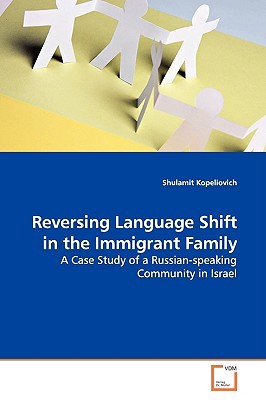
- We will send in 10–14 business days.
- Author: Shulamit Kopeliovich
- Publisher: VDM Verlag
- ISBN-10: 3639140265
- ISBN-13: 9783639140262
- Format: 15.2 x 22.9 x 1.9 cm, softcover
- Language: English
- SAVE -10% with code: EXTRA
Reversing Language Shift in the Immigrant Family (e-book) (used book) | bookbook.eu
Reviews
Description
'Your family heritage is something that you lack, but it is really there deep inside...' - says a 14-year-old bilingual adolescent. This book gives an insight into the controversial processes involved in the intergenerational transmission of a heritage language at the family and community levels. It is based on ethnographic observations of a Russian- speaking community in Israel and on individual tape- recorded interviews with seven siblings and their parents. The children report their rebellion against the home language, periods of enthusiastic linguistic rebirth, or detached appreciation of Russian. Their parents analyze painful arguments about family language management. The book proposes a detailed typology of Hebrew-induced changes, including codeswitching and grammatical convergence, in the Russian contact variety sustained by the second generation, and their distribution in individual speech samples. The research deals with current theories, such as Reversing Language Shift (Fishman, 2001); Language Management (Spolsky, 2009); Community of Practice (Wenger, 1998), Contact Linguistics (Myers-Scotton, 2002).
EXTRA 10 % discount with code: EXTRA
The promotion ends in 16d.12:10:09
The discount code is valid when purchasing from 10 €. Discounts do not stack.
- Author: Shulamit Kopeliovich
- Publisher: VDM Verlag
- ISBN-10: 3639140265
- ISBN-13: 9783639140262
- Format: 15.2 x 22.9 x 1.9 cm, softcover
- Language: English English
'Your family heritage is something that you lack, but it is really there deep inside...' - says a 14-year-old bilingual adolescent. This book gives an insight into the controversial processes involved in the intergenerational transmission of a heritage language at the family and community levels. It is based on ethnographic observations of a Russian- speaking community in Israel and on individual tape- recorded interviews with seven siblings and their parents. The children report their rebellion against the home language, periods of enthusiastic linguistic rebirth, or detached appreciation of Russian. Their parents analyze painful arguments about family language management. The book proposes a detailed typology of Hebrew-induced changes, including codeswitching and grammatical convergence, in the Russian contact variety sustained by the second generation, and their distribution in individual speech samples. The research deals with current theories, such as Reversing Language Shift (Fishman, 2001); Language Management (Spolsky, 2009); Community of Practice (Wenger, 1998), Contact Linguistics (Myers-Scotton, 2002).


Reviews